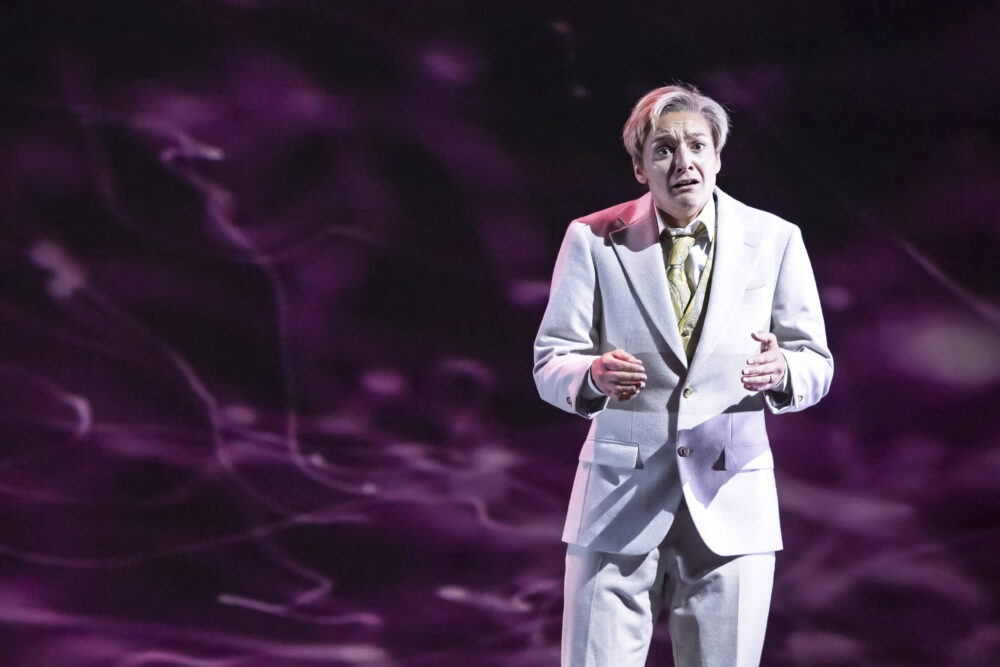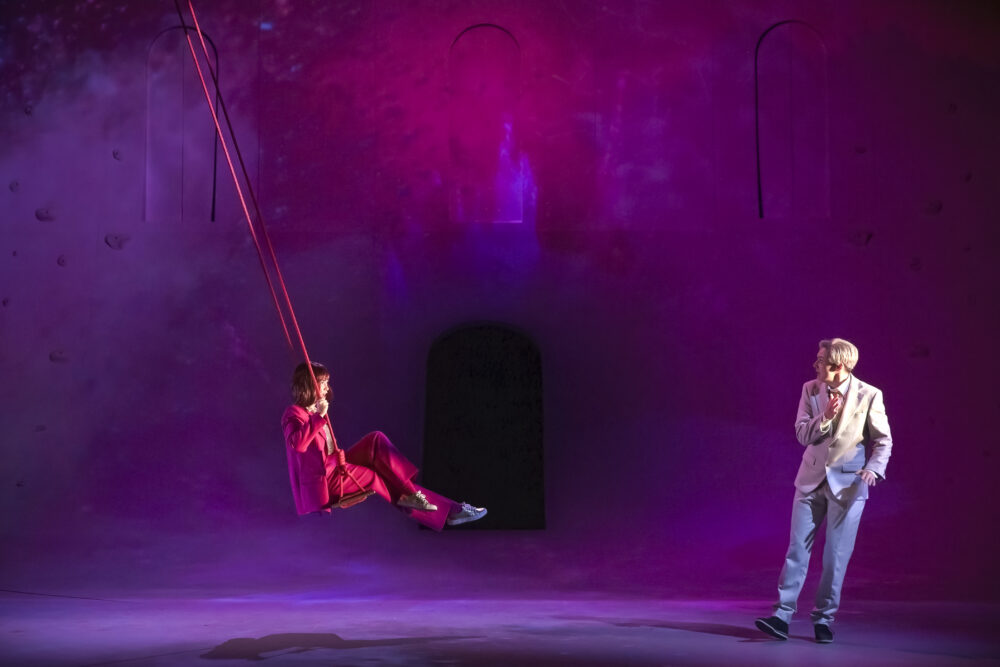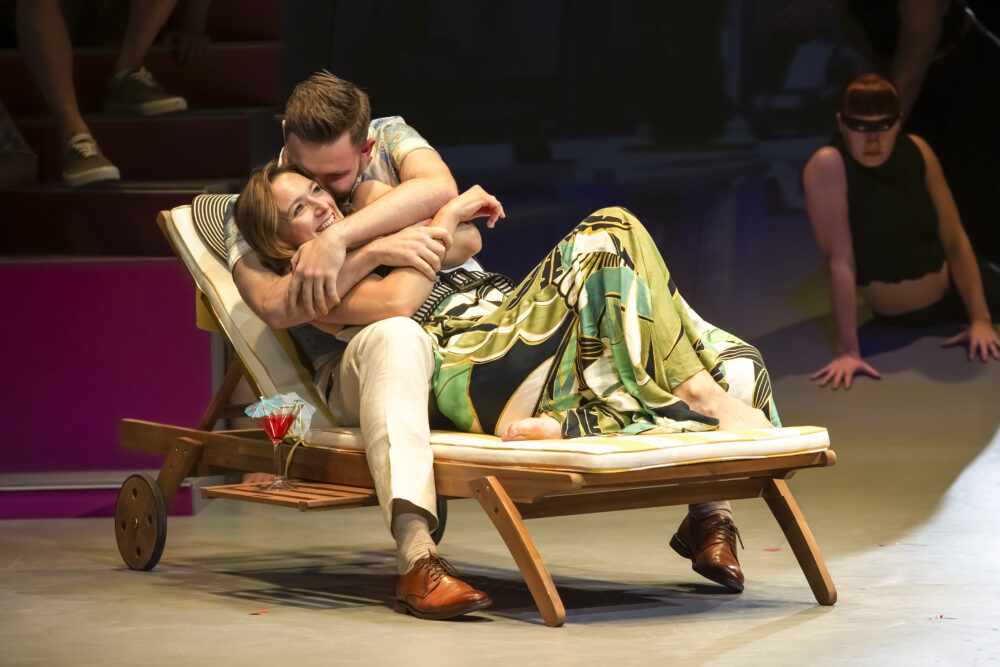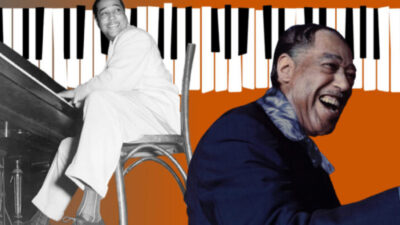
Orfeo ed Euridice/Dido and Aeneas
Double Bill
Overview
Rarely paired before, here are two early operas which changed the course of operatic history. Both end with two of the most adored arias ever written, frequent ‘guests’ on Desert Island Discs. The same two singers play the two principal roles Orpheus/Dido and Euridice/Belinda. The chorus are central players. The first of the two starts with a tragic death and ends happily. Dramatically, Dido and Aeneas is a mirror image.
We are proud to welcome back The Sixteen choir and orchestra with their founding director Harry Christophers after their triumphant Belshazzar at The Grange in 2019. Heather Lowe, scintillating as Cenerentola at The Grange in 2021, stars as Orfeo and Dido. We welcome the star British baritone James Newby as Aeneas. This is sure to be a hot ticket. The creative team of Danny Slater and Robert Innes Hopkins (Belshazzar and Tamerlano) together with movement director Tim Claydon (Belshazzar) return.
Previously shown in 2023. Discover the world-class opera, classical music, and dance performances in our 2025 festival lineup.
Production Team
-
Johanna Town Lighting Designer
- Previous Slide
- Next Slide









Reviews
It's smart and entertaining, backed up by a musical performance that makes its mark and The Sixteen and Grange Festival Chorus on excellent form.
The Grange Festival has put together the perfect combination of forces to bring these works to life…
an unbeatable combination of dramatic simplicity and instantly memorable music.
Soprano Alexandra Oomens is winningly bright and clear as Euridice, her silvery tone utterly charming and Euridice’s changing emotions – passion, joy, confusion, fear, anger – touchingly expressed.
Orfeo ed Euridice
First performed in 1762 in Vienna Orfeo ed Euridice was written as a reaction against the vocal excesses and dramatic confusions which then typified Italian opera. It is simple, direct and intensely moving. The demi-God Orpheus enchants all nature with his music and poetry. His wedding with Euridice (a version of Persephone) is tragically interrupted when a snake bites and kills her. He pursues her into the underworld using all his charm and craft and tries to bring her back but with Cupid’s warning that even a single direct look into her eyes will end her life eternally. She understandably resists his increasingly fervent attempts to lead her back to life without her once seeing his face and in desperation he gives in.
- Composer — Christoph Willibald Gluck
- Librettist — Ranieri de' Calzabigi
- Sung in — Italian
- Orchestra — The Sixteen
Cast
-
Alexandra Oomens Euridice
-
Caroline Blair Amore
Synopsis
- Previous Slide
- Next Slide
- Act I
- Act II
- Act III
~ Act I ~
Nymphs and shepherds lament the death of Euridice, who was bitten by a snake. Left alone, Orfeo, Euridice’s husband, adds his voice to the rites. Only Echo replies. Orfeo vows to rescue Euridice from the underworld.
Amore, god of love, appears with word that Jove, pitying Orfeo, will allow him to descend into the land of the dead to retrieve Euridice. To make this trial more difficult, Orfeo must neither look at Euridice, nor explain why looking is forbidden. Otherwise he will lose her forever. Orfeo agrees and begins his voyage.
~ Act II ~
Furies and ghosts try to deny Orfeo’s passage to the underworld. His lament softens and placates them. He is eventually allowed to pass through to the Elysian Fields.
Orfeo is moved by the beauty of the landscape. Heroes and heroines bring Euridice to him. Without looking at her, he takes her away.
~ Act III ~
Orfeo leads Euridice toward the upper world, forbidden to look at her. Orfeo can’t explain. Euridice panics at the thought of a life without the love of Orfeo, and, in desperation, he turns to her. She dies, again. Grief-stricken, Orfeo wonders how he can live without her. He decides to kill himself.
Amore appears and stays Orfeo’s hand. In response to Orfeo’s deep love and devotion, Amore revives Euridice for the second time. The three return to Earth.
Orfeo, Euridice, Amore, the nymphs, and the shepherds all celebrate the power of love.
Dido and Aeneas
Dido is one of the most revered women in the ancient world: the clever and enterprising founder of the prosperous city state of Carthage. Aeneas is on his long journey back from Troy and calls on her. They fall for each other, but his abrupt departure after a brief sojurn of passion drives her to despair and suicide. Henry Purcell famously wrote Dido and Aeneas for a girls school in Chelsea. It is the first English opera, and one of the greatest of all.
- Composer — Henry Purcell
- Librettist — Nahum Tate
- Sung in — English
Cast
-
Alexandra Oomens Belinda
-
Caroline Blair 2nd Woman
Synopsis
- Previous Slide
- Next Slide
- Act I - Dido's Court
- Act II - The cave of the Sorceress
- Act III - The harbour at Carthage
~ Act I - Dido's Court ~
The opera opens with Dido in her court with her attendants. Belinda is trying to cheer up Dido, but Dido is full of sorrow, saying 'Peace and I are strangers grown'. Belinda believes the source of this grief to be the Trojan Aeneas, and suggests that Carthage's troubles could be resolved by a marriage between the two. Dido and Belinda talk for a time: Dido fears that her love will make her a weak monarch, but Belinda and the Second Woman reassure her that "The hero loves as well." Aeneas enters the court, and is at first received coldly by Dido, but she eventually accepts his proposal of marriage.
~ Act II - The cave of the Sorceress ~
The Sorceress/Sorcerer is plotting the destruction of Carthage and its queen, and summons companions to help with evil plans. The plan is to send her "trusted elf" disguised as Mercury, someone to whom Aeneas will surely listen, to tempt him to leave Dido and sail to Italy. This would leave Dido heartbroken, and she would surely die. The chorus join in with terrible laughter, and the Enchantresses decide to conjure up a storm to make Dido and her train leave the grove and return to the palace. When the spell is prepared, the witches vanish in a thunderclap.
Scene 2: A grove during the middle of a hunt
Dido and Aeneas are accompanied by their train. They stop at the grove to take in its beauty. A lot of action is going on, with attendants carrying goods from the hunt and a picnic possibly taking place, and Dido and Aeneas are together within the activity. This is all stopped when Dido hears distant thunder, prompting Belinda to tell the servants to prepare for a return to shelter as soon as possible. As every other character leaves the stage, Aeneas is stopped by the Sorceress's elf, who is disguised as Mercury. This pretend Mercury brings the command of Jove that Aeneas is to wait no longer in beginning his task of creating a new Troy on Latin soil. Aeneas consents to the wishes of what he believes are the gods, but is heart-broken that he will have to leave Dido. He then goes off-stage to prepare for his departure from Carthage.
~ Act III - The harbour at Carthage ~
Preparations are being made for the departure of the Trojan fleet. The sailors sing a song, which is followed shortly by the Sorceress and her companions' sudden appearance. The group is pleased at how well their plan has worked, and the Sorceress sings a solo describing her further plans for the destruction of Aeneas "on the ocean". All the characters begin to clear the stage after a dance in three sections, and then disperse.
The palace
Dido and Belinda enter, shocked at Aeneas’ disappearance. Dido is distraught and Belinda comforts her. Suddenly Aeneas returns, but Dido is full of fear before Aeneas speaks, and his words only serve to confirm her suspicions. She derides his reasons for leaving, and even when Aeneas says he will defy the gods and not leave Carthage, Dido rejects him for having once thought of leaving her. After Dido forces Aeneas to leave, she states that "Death must come when he is gone." The opera and Dido's life both slowly come to a conclusion, as the Queen of Carthage sings her last aria, "When I am laid in Earth", also known as "Dido's Lament." The chorus and orchestra then conclude the opera once Dido is dead by ordering the "cupids to scatter roses on her tomb, soft and gentle as her heart. Keep here your watch, and never, never part."

Stay connected
Join The Grange Festival community and stay connected to a world of enchanting performances and exclusive events.












